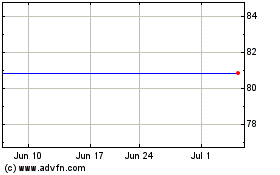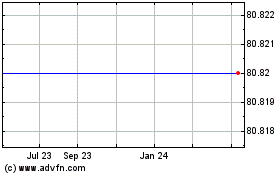St. Jude Medical Announces Approval of ShockGuard™ Technology with New DecisionTx™ Programming for Unify & Fortify Implan...
April 14 2011 - 8:00AM
Business Wire
St. Jude Medical, Inc. (NYSE:STJ), a global medical device
company, today announced that it has received U.S. Food and Drug
Administration (FDA) and European CE mark approval of its
ShockGuard™ technology. The technology, which can be used with new
and existing Unify™ cardiac resynchronization therapy
defibrillators (CRT-Ds) and Fortify™ implantable cardioverter
defibrillators (ICDs), is designed to reduce inappropriate and
unnecessary shocks for patients with these devices.
The Unify CRT-D and Fortify ICD with ShockGuard technology
features DecisionTx™ programming that discriminates between rhythms
that require defibrillation therapy and those that do not. The
ShockGuard technology with DecisionTx programming offers advanced
sensing technology designed to avoid sensing unwanted signals
(T-waves) and more anti-tachycardia pacing options, which can
convert many fast ventricular arrhythmias painlessly and avoid the
need for high voltage shocks.
“The St. Jude Medical ShockGuard technology has been
demonstrated to reduce inappropriate defibrillation therapy, while
still ensuring that patients will receive the treatment needed for
life-threatening ventricular arrhythmias,” said Thomas F. Deering,
M.D., FHRS, FACC, FACP, CCDS, Piedmont Heart Institute in Atlanta,
Ga. “This technology was based on real world data and analysis
representing actual patient populations who receive implantable
cardiac defibrillators.”
A retrospective analysis of the Advancements in ICD Therapy
(ACT) registry, which enrolled more than 5,000 patients and allowed
programming at the physician’s discretion, demonstrated that at the
end of one year, 98.5 percent of patients with DecisionTx
programming would be free of inappropriate shocks. In addition, the
ACT registry analysis demonstrated a DecisionTx total shock
reduction impact of 57 percent, with appropriate shocks for
ventricular tachycardia (VT) and ventricular fibrillation (VF)
reduced by 41 percent and inappropriate shocks for all other
conditions, including supraventricular tachycardia (SVT), reduced
by 80 percent.
“The goal for this innovative technology was to address one of
the most significant clinical challenges facing physicians today,
how to reduce not only instances of inappropriate therapy, but also
reduce shocks for VT and VF episodes, which may be associated with
worse outcomes,” said Eric S. Fain, M.D., president of the St. Jude
Medical Cardiac Rhythm Management Division. “DecisionTx represents
the first step of our new ShockGuard technology and further
supports our commitment to deliver more control to physicians
worldwide.”
An ICD is an advanced implantable device that treats potentially
lethal, abnormally fast heart rhythms (ventricular tachycardias or
ventricular fibrillation), which often lead to sudden cardiac death
(SCD). Approximately 325,000 people per year in the U.S. die
suddenly of SCD.
A CRT-D device resynchronizes the beating of the heart's lower
chambers (ventricles), which often beat out of sync in heart
failure patients, and provides back up treatment for SCD, which is
a risk factor associated with certain types of heart failure.
Studies have shown that CRT (cardiac resynchronization therapy) can
improve the quality of life for many patients with heart failure, a
progressive condition in which the heart weakens and loses its
ability to pump an adequate supply of blood. About five million
Americans suffer from heart failure, with 550,000 new cases
diagnosed every year, according to the American Heart
Association.
The Unify CRT-D and Fortify ICD have been fully-launched in
Europe and the U.S.
About St. Jude Medical
St. Jude Medical develops medical technology and services that
focus on putting more control into the hands of those who treat
cardiac, neurological and chronic pain patients worldwide. The
company is dedicated to advancing the practice of medicine by
reducing risk wherever possible and contributing to successful
outcomes for every patient. St. Jude Medical is headquartered in
St. Paul, Minn. and has four major focus areas that include:
cardiac rhythm management, atrial fibrillation, cardiovascular and
neuromodulation. For more information, please visit sjm.com.
Forward-Looking Statements
This news release contains forward-looking statements within the
meaning of the Private Securities Litigation Reform Act of 1995
that involve risks and uncertainties. Such forward-looking
statements include the expectations, plans and prospects for the
Company, including potential clinical successes, anticipated
regulatory approvals and future product launches, and projected
revenues, margins, earnings and market shares. The statements made
by the Company are based upon management's current expectations and
are subject to certain risks and uncertainties that could cause
actual results to differ materially from those described in the
forward-looking statements. These risks and uncertainties include
market conditions and other factors beyond the Company's control
and the risk factors and other cautionary statements described in
the Company's filings with the SEC, including those described in
the Risk Factors and Cautionary Statements sections of the
Company's Annual Report on Form 10-K for the fiscal year ended
January 1, 2011. The Company does not intend to update these
statements and undertakes no duty to any person to provide any such
update under any circumstance.
SJM (NYSE:STJ)
Historical Stock Chart
From Jun 2024 to Jul 2024

SJM (NYSE:STJ)
Historical Stock Chart
From Jul 2023 to Jul 2024
